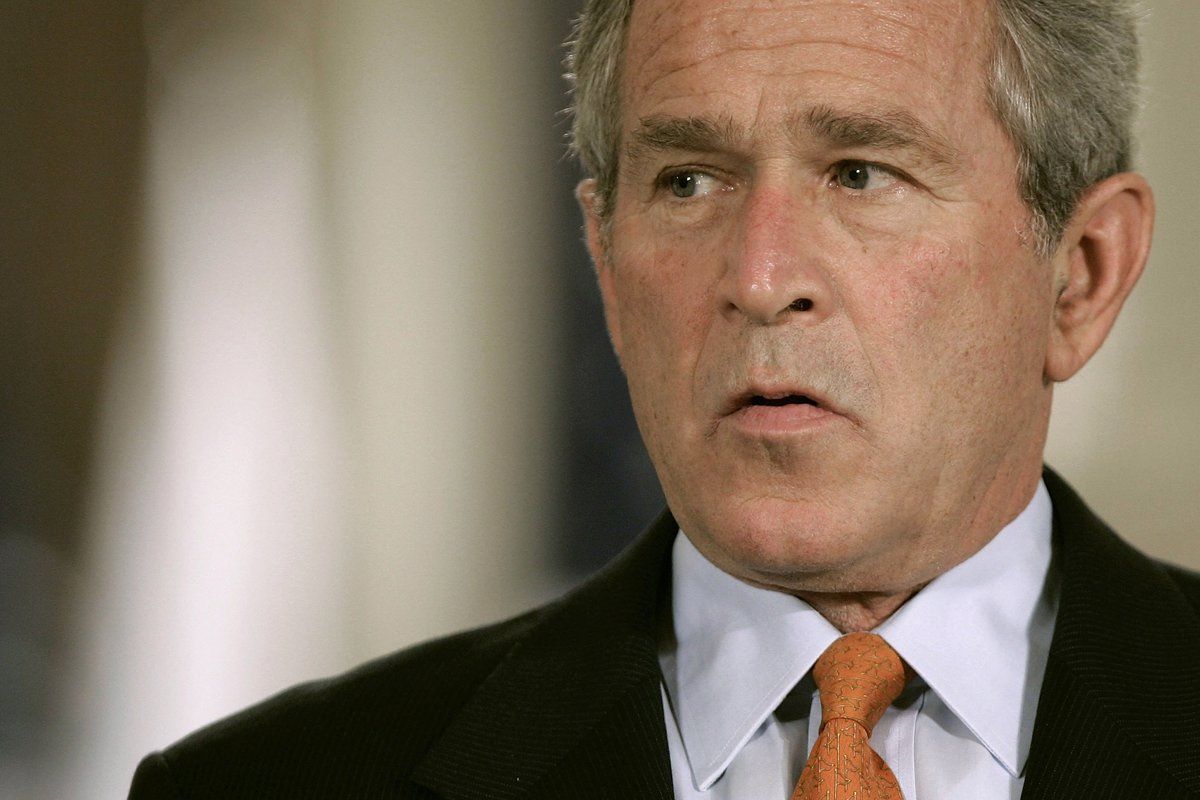
Remember George W. Bush? It doesn't seem all that long ago that he was the revered leader of the Republican Party: a paragon of courage, scourge of terrorists, champion of neglected schoolkids. But now GOP candidates seem to be running against him almost as aggressively as they're running against his Democratic successor. They reject his brand of "compassionate" conservatism and vow to shrink a government that became bloated on his watch. Bush ran the country for eight tumultuous years, but his tenure is being treated like a bender from which the party is still hung over.
Dan Bartlett, Bush's White House counselor, says GOP contenders are simply currying favor with "the harder-core conservative constituency that's the dominant power broker in the Republican Party now." As for the former president, "Does he like people mischaracterizing and demonizing his record? He'd prefer it not to happen."
But it happens again and again. Rick Santorum regularly apologizes for voting in favor of Bush's No Child Left Behind law, and has drawn flak for saying he had to "take one for the team." No one wants to be on that team right now, not in a supercharged environment where the Republican right has made even birth control an issue. Santorum boasted at one debate that he had pushed for tougher sanctions against Iran and for that reason had "President Bush oppose me for two years."
Mitt Romney, for his part, has been hammered for siding with Bush on rescuing Wall Street through the TARP bailout. He hasn't exactly turned on Bush, but he has been forced to proclaim repeatedly in his own defense that the economy was facing a "complete collapse." Romney has mollified the base by adopting a hard line on illegal immigration, in sharp contrast to Bush's unsuccessful proposal to grant temporary legal status to millions of undocumented workers. Bush's position would be hooted off the debate stage in 2012.
"It saddens me he doesn't get the acclaim on the stump," says Ari Fleischer, Bush's former spokesman. After all, Romney, Santorum, and Newt Gingrich (as a member of Bush's Defense Policy Board) backed the decision to invade Iraq. And they all supported the budget-busting Medicare prescription-drug program as well. So why don't they acknowledge and embrace those areas of agreement? "I don't know if it's repudiation as much as it is avoidance, because they don't want to deal with Democratic attacks in the fall for having said something praiseworthy about President Bush," says Fleischer.
Mark McKinnon, a top campaign strategist for Bush, also feels the party should be giving his former boss more "credit and respect." What's more, he argues that Republicans ignore Bush's legacy "at the expense of losing important blocs that would help them win the presidency." But independent voters become crucial only in the fall. First a candidate has to win the nomination fight, which has become a right-wing panderfest.
One reason the anti-Bush wing is ascendant is that W., determined to avoid the spotlight in his post-presidential years, has refused to fight for himself. The political culture coarsened after he departed, giving rise to the crazed birther movement and a Tea Party that fueled the Republican takeover of the House, shaking the party establishment of which Bush was a pillar. Cooperation became a dirty word.
Bush, of course, made his own deals with the party's most rabid conservatives, particularly on terrorism and tax cuts. But now even onetime allies are abandoning Bush-style politics. Such longtime conservative senators as Orrin Hatch and Dick Lugar are moving sharply right, while a centrist like Olympia Snowe is abandoning Congress altogether. Bush's brother Jeb says sardonically that "I used to be a conservative" and now finds it "a little troubling sometimes when people are appealing to people's fears and emotion." It was a rare public hint that the Bush clan is not pleased.
The 43rd president, having left office with the economy a shambles, understands the rules of the game. Onetime aides say he doesn't want them wasting capital defending him. "Democrats wish he was out there because they'd like to have a foil," says Fleischer. A former top official who stays in touch with Bush recalls him explaining his passivity when John McCain criticized him during the 2008 campaign: "Look at how Hillary has to distance herself from Bill, and I had to distance myself from my dad. America always wants something new." Perhaps, but the Obama campaign is unlikely to allow Bush's party to airbrush him completely out of the picture.
Uncommon Knowledge
Newsweek is committed to challenging conventional wisdom and finding connections in the search for common ground.
Newsweek is committed to challenging conventional wisdom and finding connections in the search for common ground.





